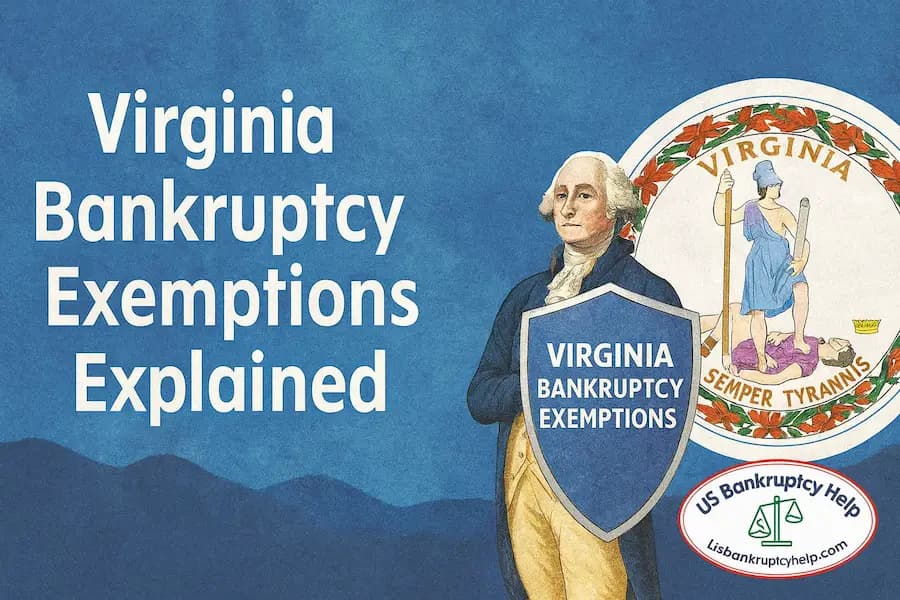

Virginia Bankruptcy Exemptions Explained
Filing for bankruptcy in Virginia can feel overwhelming, especially if you are afraid of losing your home, car, or basic household items. In reality, Virginia bankruptcy exemptions are the rules that say what you are allowed to keep when you file.
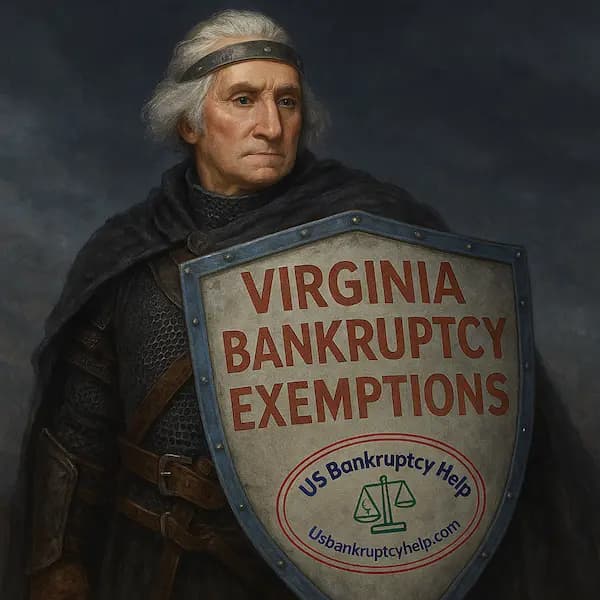
Before we dive into the detailed statutes and dollar amounts, here is a quick look at how the main Virginia bankruptcy exemptions work in practice.
Virginia Bankruptcy Exemptions — At a Glance
- State System, Not Federal: Virginia has opted out of the federal exemption list. Most filers must use the Virginia bankruptcy exemptions in Title 34 of the Code of Virginia and related statutes, plus limited federal non-bankruptcy protections.
- Homestead & Wildcard Pool: A householder can claim a general homestead amount (typically $5,000, or $10,000 if 65+, plus $500 per dependent and an extra $10,000 for some disabled veterans) and may protect up to $50,000 in equity in a principal residence when properly claimed. Together, these function as a flexible “wildcard” pool you can aim at home equity, cash, tax refunds, or other vulnerable property.
- Eight-Year Homestead Clock: Amounts you use under the homestead provisions count against your available homestead pool for an eight-year period (not for life). Prior homestead use—inside or outside bankruptcy—must be factored into any new case filed within that window.
- Motor Vehicle Exemption: Under the “poor debtor’s” personal property rules, many filers can protect up to $10,000 in total equity in one or more vehicles that are not claimed as tools of the trade. Equity means value minus the loan payoff; you can often layer homestead/wildcard on top if needed.
- Household Goods & Clothing: Bankruptcy exemptions in Virginia typically shield up to $5,000 in household furnishings and basic electronics, plus around $1,000 in wearing apparel, along with reasonable family and school books—valued at realistic used (“yard-sale”) prices.
- Tools of the Trade: Up to about $10,000 in tools, equipment, and in some cases a work vehicle “necessary” for your occupation can be exempt. This is crucial for contractors, mechanics, hairstylists, gig-workers, and small business owners who earn their living with specific tools.
- Retirement & Annuities: Most tax-qualified retirement accounts—401(k)s, many IRAs and pensions—are strongly protected under a mix of Virginia law (such as Va. Code § 34-34) and the federal Bankruptcy Code. Many life-insurance–based annuities also get special protection under Title 38.2, subject to exceptions for fraud, recent purchases, or certain domestic-relations orders.
- Wages, Benefits & Support: Virginia exemptions and federal law together limit how much of your paycheck can be garnished and protect key benefits and support—like Social Security, unemployment, and child support you receive—so you can still cover basic living expenses while dealing with past-due debts.
- Chapter 7 vs. Chapter 13 Effect: In Chapter 7, the Virginia exemptions decide what the trustee can sell and what you keep. In Chapter 13, those same Virginia exemptions for bankruptcyhelp determine how much your unsecured creditors must receive over the life of your repayment plan.
- Why Strategy (and Counsel) Matter: The same set of Virginia bankruptcy exemptions can play out very differently depending on how you stack them on your assets and which chapter you choose. A short planning session with an experienced Virginia bankruptcy attorney can help you allocate homestead/wildcard wisely and protect as much property as the law allows.
These bankruptcy exemptions in Virginia determine which assets are off-limits to the bankruptcy trustee. They can protect things like a portion of your home equity, a reliable vehicle, essential household goods, and in some cases even cash or other property. The protections come from Virginia law, not federal law.
Because Virginia has opted out of the federal exemption system, Virginia residents must use state-specific bankruptcy Virginia exemptions. You cannot mix and match with federal exemptions, so understanding how the Virginia system works is critical before you file.
Some of the most important Virginia exemptions for bankruptcy include:
- Virginia bankruptcy homestead exemption: Protects some of your home equity and, in certain situations, other property.
- Wildcard exemption: Extra protection you can apply to almost any type of property that matters most to you.
- Personal property exemptions: Coverage for household goods, vehicles, clothing, and other day-to-day essentials.
When people talk about Virginia exemptions bankruptcy, they are really talking about this list of protections and how to use them to your advantage. Used correctly, these exemptions can be the difference between keeping a stable base to rebuild your life and surrendering property you could have protected.
The rest of this guide walks through each category in plain English so you can spot issues early, ask better questions, and work with a knowledgeable bankruptcy attorney to choose the best path forward.
What Are Virginia Bankruptcy Exemptions and What Do They Do?
When you file for bankruptcy, the court does not automatically take everything you own. Instead, the law draws a line between property that can be used to pay creditors and property you are allowed to keep. That protected property is called exempt property, and the rules that define it are known as bankruptcy exemptions.
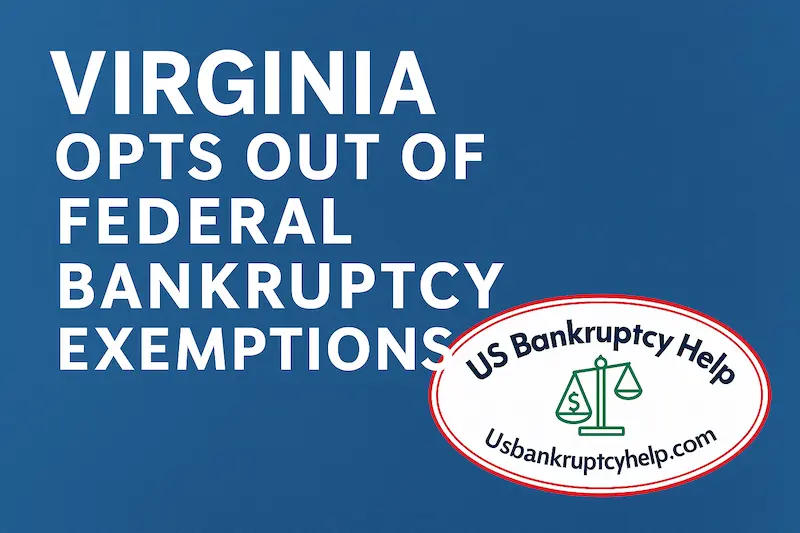
In practical terms, bankruptcy exemptions in Virginia decide which assets you can legally retain while still getting the relief of a bankruptcy discharge. Exemptions can shield things like home equity, a car you need to get to work, basic household goods, and retirement savings. Without exemptions, bankruptcy would be far harsher and many people would be left without the basic tools they need to rebuild.
At the federal level, Congress created the general exemption framework in the Bankruptcy Code (11 U.S.C. § 522), and then allowed each state to choose whether to use the federal exemption list or its own. Virginia has opted out of the federal list, which means most filers must use Virginia exemptions for bankruptcy found in the Code of Virginia, rather than the federal bankruptcy exemption scheme.
The core Virginia bankruptcy exemptions come from Title 34 of the Code of Virginia – “Homestead and Other Exemptions”. Key provisions include:
- Homestead exemption: Va. Code § 34-4, which allows a householder to protect a defined amount of real or personal property, including equity in a principal residence.
- Personal property (“poor debtor’s”) exemptions: Va. Code § 34-26, which lists specific categories of household goods, furniture, clothing, tools of the trade, and other items that are protected from creditor process.
- Wage protection: Va. Code § 34-29, which limits how much of your paycheck can be garnished.
You can review the official text of these laws directly on the Commonwealth’s Legislative Information System website:Va. Code § 34-4 (homestead exemption), Va. Code § 34-26 (personal property exemptions), and Va. Code § 34-29 (wages). For a broader view, you can also seethe full Title 34 PDF published by the Commonwealth.
Here are some common asset categories that are often protected by exemptions in a Virginia bankruptcy case:
- Home equity (often through the Virginia homestead exemption)
- Motor vehicles needed for work and daily life
- Personal property such as furniture, appliances, and clothing
- Retirement accounts and certain insurance benefits
- Public benefits like Social Security or unemployment, within legal limits
Because Virginia bankruptcy exemptions are created by state statute and adjusted over time, the exact dollar limits and rules can change. Getting current information and, ideally, advice from a knowledgeable Virginia bankruptcy attorney can help you use these protections to preserve as much of your property as possible.
In the next section, we will outline the major categories of Virginia exemptions in a simple table so you can see, at a glance, how different types of property may be treated if you file.
Overview of Virginia Bankruptcy Exemptions
Virginia bankruptcy exemptions work like a protective shield around certain types of property when you file for bankruptcy. Because Virginia has opted out of the federal exemption list, you generally must rely on the exemptions found in Title 34 of the Code of Virginia instead of the federal exemption scheme. Knowing the state rules is crucial before you file. You must be a resident of Virginia for at least 730 days to use Virginia bankruptcy exemptions.
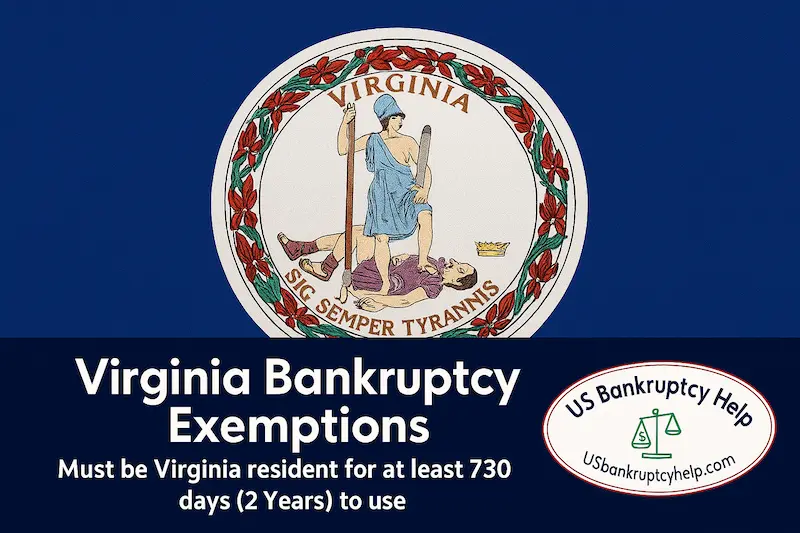
At a high level, these bankruptcy exemptions in Virginia are designed to protect core essentials—some home equity, a dependable vehicle, basic household goods, tools needed for work, and, in many cases, retirement funds and certain benefits. Used correctly, the Virginia exemptions for bankruptcy can help you keep a livable base of property while still getting a fresh start.
The chart below summarizes several of the main Virginia bankruptcy exemptions that most individual filers ask about. It is not exhaustive, but it gives you a sense of how different categories of property are treated.
| Exemption Category | Virginia State Exemption (Individual / Notes) | Key Statute / Authority |
|---|---|---|
| Homestead Deed & Wildcard (Real or Personal Property) | The Virginia bankruptcy homestead exemption allows a householder to protect a pool of value in real or personal property of their choice. In general, an individual can claim up to $5,000 in property, or $10,000 if the householder is 65 or older, plus an additional $500 for each dependent. Certain disabled veterans with a qualifying service-connected disability can protect an additional $10,000 in property. In addition, a householder may protect up to $50,000 in equity in real or personal property used as the principal residence when properly claimed. Amounts claimed under these homestead provisions count against your available homestead cap for an eight-year period under Virginia law, not for life. In bankruptcy cases, these exemptions are typically asserted on your bankruptcy exemption schedules; outside bankruptcy, they are generally claimed by recording a homestead deed, which is why this exemption often functions as Virginia’s “wildcard” for bankruptcy planning. | Va. Code § 34-4, Va. Code § 34-4.1, Title 34, Code of Virginia (PDF) |
| Motor Vehicle | Virginia’s personal property exemptions include protection for motor vehicles. A householder can usually exempt up to $10,000 in equity in one or more motor vehicles that are not already being claimed as “tools of the trade.” A separate tools-of-the-trade exemption (listed below) can also cover a work vehicle in some situations. The exemption applies to your equity, so a vehicle with a loan is only counted to the extent of its value above the payoff balance. | Va. Code § 34-26(8), Form DC-407 (Virginia Courts) |
| Household Goods & Furnishings | Virginia’s “poor debtor’s” exemption protects common household property. A householder may generally exempt up to $5,000 in household furnishings (beds, dressers, appliances, basic electronics, and similar items), plus up to $1,000 in wearing apparel. The values are based on fair market (used) value, not what you originally paid at the store. | Va. Code § 34-26, Form DC-407 (Virginia Courts) |
| Tools of the Trade / Work Equipment | If you rely on specific tools, equipment, or even a work vehicle to earn a living, Virginia allows you to protect up to $10,000 in the tools and equipment “necessary for use in the course of the householder’s occupation or trade.” This can include professional tools, machinery, and in some cases a vehicle used primarily for work. This exemption is especially important for tradespeople, small business owners, and students in vocational programs. | Va. Code § 34-26(7), Form DC-407 (Virginia Courts) |
| Retirement Accounts & Pensions | Most tax-qualified retirement accounts and pensions receive very strong protection. Under a combination of federal bankruptcy law and Virginia’s retirement exemption, many 401(k)s, traditional and Roth IRAs, and employer-sponsored plans are exempt up to the limits allowed under federal law, as long as the funds remain in the retirement account and the plan is properly qualified. | Va. Code § 34-34, 11 U.S.C. § 522(b)(3)(C), (d)(12) |
| Wages & Certain Benefits | Virginia law limits how much of your wages can be garnished and also protects certain public benefits. In many cases, a portion of your paycheck, Social Security benefits, unemployment compensation, and some other benefits remain exempt, even when you are in financial distress. These rules matter both inside and outside bankruptcy. | Va. Code § 34-29, Form DC-407 (selected federal & state benefit protections) |
This table only highlights some of the more commonly used Virginia exemptions for bankruptcy. The actual exemptions available in your case—and how much protection they offer—depend on your specific facts, timing, and how you file your homestead deed and other paperwork. Because exemption amounts and interpretations can change, it is wise to verify the current numbers in the Code of Virginia and court forms and to talk with a knowledgeable Virginia bankruptcy attorney before you file.
Virginia Bankruptcy Homestead Exemption: Protecting Your Home
The Virginia bankruptcy homestead exemption is one of the most important tools for protecting home equity and other property when you are in serious financial trouble. In a bankruptcy case, it can help you keep the roof over your head instead of watching your equity disappear to pay unsecured creditors.
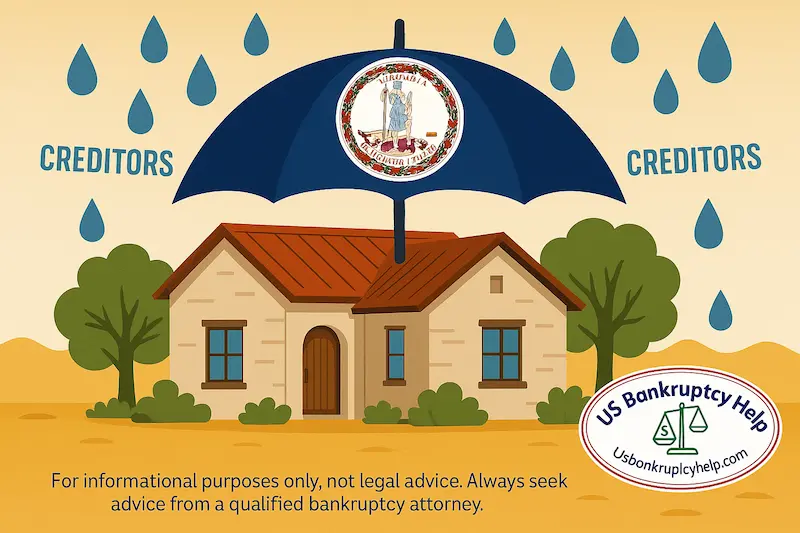
Under current Virginia law, a householder can claim a general homestead amount in real or personal property, plus an additional homestead amount specifically for the principal residence. In many cases, this can mean protecting up to tens of thousands of dollars in home equity, with higher caps if you are 65 or older, have qualifying dependents, or meet the criteria for the disabled veteran add-on. The exact figures are set out in Title 34 of the Code of Virginia and can change over time, so it is important to work with up-to-date information.
Historically, Virginia required a homestead deed to be recorded in the local land records for the exemption to be effective. Today, in a bankruptcy case, the homestead exemption is usually asserted on your bankruptcy exemption schedules, while outside of bankruptcy it is still commonly claimed through a recorded homestead deed. How and when you claim the exemption matters just as much as the dollar amounts you are entitled to.
Key Features of Virginia’s Bankruptcy Homestead Exemption
- Pool of Protected Value: The homestead exemption lets you protect a pool of value in your property— including cash, personal property, or real estate—up to the limits set by Virginia law. Part of that pool can be used specifically to protect equity in your principal residence.
- State-Specific Limits & 8-Year Window: Virginia sets its own dollar limits (separate from federal exemptions), and amounts you claim under the homestead provisions count against your available homestead cap for an eight-year period before they “refresh.” Planning when and how to use this exemption is a key part of Virginia bankruptcy strategy.
- How It’s Claimed: In bankruptcy, your homestead rights are typically claimed on your exemption schedules; in non-bankruptcy collection cases, you generally protect property by filing a homestead deed in the appropriate Virginia circuit court land records.
The homestead exemption is not limited to traditional single-family homes. It can also apply to qualifying condos, townhomes, manufactured or mobile homes, and—in some cases—other real or personal property used as your principal residence, as long as you have an ownership interest. That flexibility allows many Virginians to tailor the exemption to their actual living situation.
Additional Protections for Certain Groups
- Older Homeowners: Householders who are 65 or older can claim a larger homestead amount than younger filers, giving seniors extra room to protect equity and other property.
- Disabled Veterans: Eligible veterans with a qualifying service-connected disability can claim an additional homestead amount on top of the standard limits, which can significantly increase the protection available in a bankruptcy or collection case.
- Married Couples: When both spouses qualify as householders and file jointly, each may be able to claim homestead protections up to their own caps, subject to the eight-year rules and other statutory limits.
Thoughtfully using the Virginia homestead exemption can make the difference between keeping your home and losing hard-earned equity. For most people, that means reviewing the statutes carefully, looking at prior homestead usage within the last eight years, and coordinating with an experienced Virginia bankruptcy attorney so the exemption is properly claimed and documented.
In short, Virginia’s homestead exemption remains a vital protection for homeowners, but it only works to its full potential when you understand the rules, respect the deadlines, and claim it correctly in your bankruptcy case or state-court collection matter.
Wildcard Exemption in Virginia Bankruptcy
When people talk about a “wildcard” under the Virginia bankruptcy exemptions, they are usually talking about the unused portion of the Virginia homestead exemption that can be pointed at almost any asset. Instead of protecting only your house, this pool of value can be applied to whatever property matters most to you in a bankruptcy case.
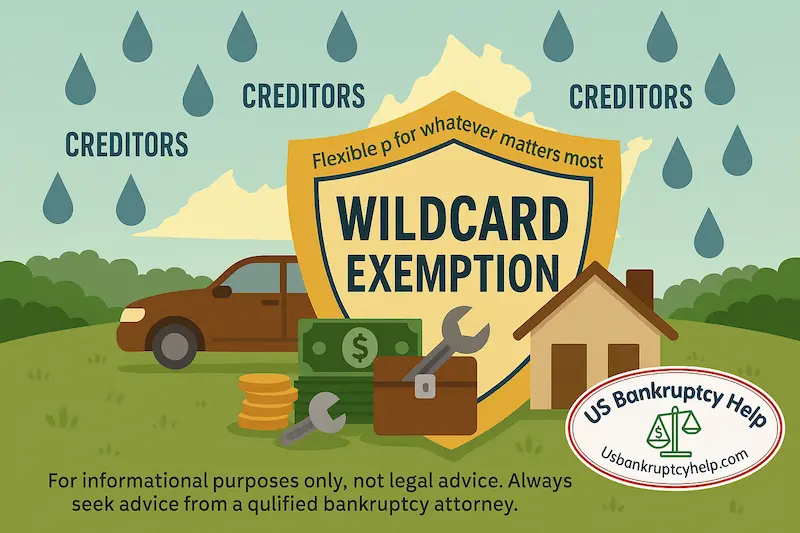
Practically, that means the wildcard portion of the homestead can cover things that other specific exemptions do not fully protect—extra equity in a car, a savings account, a pending tax refund, business equipment, or even cash in the bank. Used strategically, this “wildcard” can be one of the most powerful Virginia exemptions for bankruptcy planning.
Key Aspects of the Wildcard Exemption
- Flexible Use: The homestead-based wildcard can be applied to nearly any kind of real or personal property, not just your home. You decide which assets to cover, subject to the overall dollar limits in Virginia law.
- Strategic Application: Because the wildcard is limited, most debtors use it to “top off” protection on high-risk or high-value items—like extra equity in a vehicle, a tax refund that would otherwise go to creditors, or tools they rely on to earn a living.
- Capped and Time-Limited: The total amount you can claim under the homestead provisions is capped and anything you use counts against your available homestead pool for an eight-year period. Once you use part of your homestead/wildcard, you need to factor that prior use into any later bankruptcy or collection strategy.
Because the wildcard sits on top of other, more specific bankruptcy exemptions in Virginia, it is important to look at your entire balance sheet before deciding where to apply it. Many filers start by listing what is already covered by specific exemptions (household goods, wages, retirement, and so on), and then use the wildcard to plug the remaining gaps on the assets that are most exposed.
In short, the wildcard exemption in Virginia bankruptcy is a versatile planning tool. When coordinated with the homestead and other Virginia exemptions, it can significantly increase the amount of property you keep through the process and give you a stronger foundation for your financial reset on the other side of bankruptcy.
Motor Vehicle and Personal Property Exemptions
Under the Virginia bankruptcy exemptions, a surprising amount of day-to-day property is protected. That includes your car, basic household furnishings, clothing, and the tools you need to work. Understanding how thesebankruptcy exemptions in Virginia apply to motor vehicles and personal property is a big part of planning a successful bankruptcy case.
Motor Vehicle Exemption
Virginia’s personal property laws allow a householder to protect equity in one or more motor vehicles that are not claimed as tools of the trade. In many cases, an individual can exempt up to $10,000 in total vehicle equity under Va. Code § 34-26, with additional protection sometimes available through the homestead (wildcard) pool.
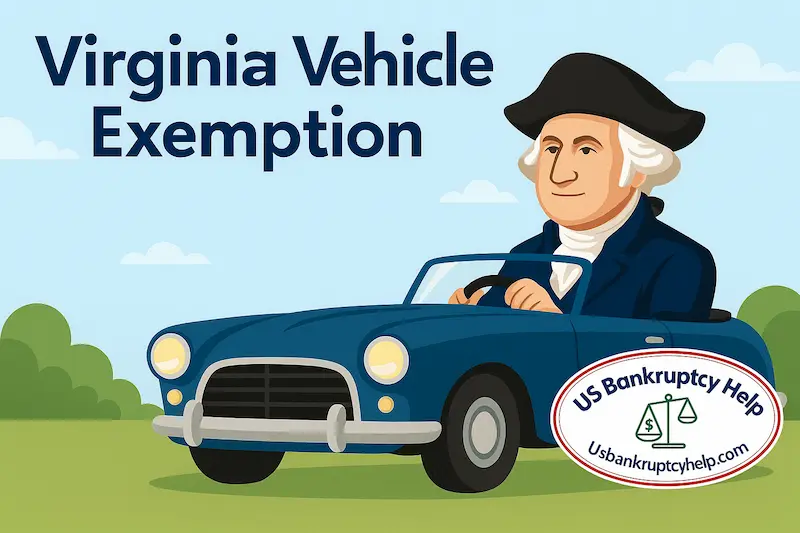
Because the exemption applies to equity, the key number is your car’s fair market value minus the payoff on any auto loan. For example, if your car is worth $15,000 and you still owe $8,000, you have $7,000 of equity—well within the standard Virginia motor vehicle exemption for many filers.
In a typical Chapter 7 or Chapter 13 case, this exemption is what allows most Virginia filers to keep a reliable vehicle so they can commute to work, get children to school, and handle everyday responsibilities while they work through their debts.
Personal Property Exemptions
Virginia also extends strong protection to basic household property under its so-called “poor debtor’s” exemptions. These Virginia exemptions for bankruptcy apply to many of the things you use every day:
- Household Goods: Items like beds, couches, tables, basic appliances, and ordinary electronics are protected up to a total dollar cap under Va. Code § 34-26. The law looks at fair market (used) value, not what you originally paid.
- Clothing and Books: Reasonable amounts of wearing apparel and family or school books are also exempt up to the limits set by statute, helping ensure you do not have to give up basic clothing or children’s school materials to make a fresh start.
Beyond the basics, Virginia law protects additional categories of personal property that often matter a great deal in real life:
- Tools of the Trade: Up to a defined amount in tools, equipment, and in some cases a work vehicle that is necessary for your occupation or trade. This can be critical for contractors, mechanics, hairstylists, and other self-employed Virginians who literally earn a living with their tools.
- Jewelry & Personal Items: Everyday jewelry and personal effects are protected within the overall personal property caps. High-value or luxury items may require extra planning and careful use of the homestead/wildcard exemption to keep them safe.
The key to using these Virginia exemptions bankruptcy rules effectively is accurate valuation and a clear inventory. Listing what you own, assigning realistic used-value numbers, and then matching each item to the most favorable exemption can dramatically change the outcome of your case.
In short, motor vehicle and personal property exemptions are what keep bankruptcy from stripping away the tools and basics you need to live and work. When coordinated with the homestead and wildcard exemptions, they give most Virginia filers the ability to protect the core of their household while still getting real debt relief.
Wage, Alimony, and Child Support Exemptions
In Virginia, certain income sources receive special protection in bankruptcy so you can continue paying for housing, food, transportation, and family needs while you deal with past-due debts. Understanding how wages and support payments are treated can make a big difference in how safe you feel going into a case.
Wage Exemptions
Virginia law and federal law together limit how much of your paycheck can be taken for most debts. In many situations, only a portion of your disposable earnings can be reached, and some or all of your wages may effectively be protected in a typical consumer bankruptcy case. These wage protections are designed so that you can continue earning a living, paying rent or a mortgage, buying groceries, and covering other basic expenses while your case is pending.
The exact percentage that can be reached depends on your income level, the type of debt, and whether there are special orders in place (for example, support or tax collection). A Virginia bankruptcy attorney can help you apply the wage exemption rules to your actual paycheck.
Alimony Protection
Support payments you receive as alimony (spousal support) are treated differently from ordinary wages. In most cases, ongoing alimony that you are entitled to receive is treated as a protected source of support rather than as an asset that can be taken to pay general unsecured creditors in a chapter 7 case. At the same time, if you are the one whopays alimony, those obligations are generally not discharged in bankruptcy and must continue to be paid.
Because support rights and obligations are often intertwined with divorce decrees and domestic relations orders, it is important to review your alimony situation with counsel before filing so you understand what is protected and what will continue after bankruptcy.
Child Support
Child support is treated as a top priority under both federal bankruptcy law and Virginia law. If you are receiving child support, those payments are typically protected as critical support for your children and are not treated as a pot of money for other creditors in a chapter 7 case. If you owe child support, that obligation is notdischarged in bankruptcy and must continue to be paid, both during and after the case.
These protections reflect a policy choice: day-to-day living and the well-being of children come before most other debts. Knowing that essential income sources such as wages (within limits), alimony you receive, and child support are either protected or treated as ongoing obligations can make it easier to plan a Virginia bankruptcy filing and focus on dealing with credit cards, medical bills, and other unsecured debts.
How to Claim Virginia Bankruptcy Exemptions
Claiming exemptions in a Virginia bankruptcy case is not automatic. You have to list your property, choose the correct Virginia exemptions, and claim them properly on the bankruptcy forms. Doing this correctly can be the difference between a simple “no-asset” case and a case where the trustee has something to sell.
The first step is identifying which exemptions apply to your particular mix of assets. That means understanding Virginia-specific laws and, in some cases, how federal nonbankruptcy exemptions and retirement protections interact with state law. Careful planning before you file usually gives you more protection than trying to fix problems later.
Steps to Claim Exemptions
- Review Virginia exemption laws: Familiarize yourself with the main Virginia exemptions in Title 34 of the Code of Virginia and any other exemptions that might apply to your home, vehicle, personal property, retirement accounts, or benefits.
- Inventory your assets and equity: Make a detailed list of everything you own (and co-own), along with realistic values and any liens. This helps you line up each asset with a specific exemption.
- Match assets to specific exemptions: Decide which statute you will use to protect each item or category of property, and how much of your available exemption you will allocate to that asset.
- Complete the bankruptcy forms correctly: On your bankruptcy schedules—especially the property schedules and Schedule C where you list exemptions—you must cite the correct exemption laws and clearly identify the property you are trying to protect.
- Observe homestead and timing requirements: Virginia has specific rules and deadlines for claiming certain exemptions (including homestead-related protections). Missing a deadline or failing to file required documents can reduce or eliminate an exemption you thought you had.
- File with the court and respond to the trustee: Once your case is filed, the Chapter 7 trustee will review your exemptions. If the trustee has questions or objects, you and your attorney may need to clarify or amend your exemptions.
Paying close attention to deadlines and technical details is critical. Missing a filing date, mis-citing a statute, or leaving property off your schedules can jeopardize your exemption claims and give the trustee an opening to pursue assets you meant to protect.
Because Virginia exemption planning can be technical and the stakes are high, most people are better off working with an experienced Virginia bankruptcy attorney. A lawyer can help you choose the right exemptions, complete Schedule C and any required homestead filings correctly, and protect as much property as the law allows. Properly claiming exemptions sets the stage for a smoother bankruptcy case and a more stable financial recovery on the other side.
Special Considerations: Married Couples, Elderly, and Disabled Filers
Bankruptcy does not impact everyone in the same way. In Virginia, there are important differences in how exemptions and planning work for married couples, older filers, and people living with disabilities. Understanding these nuances before you file can help you protect more of what matters.
Married couples who file jointly may each be able to claim certain exemptions, or rely on how title is held (for example, property owned together), but the rules are technical and do not simply “double” every exemption across the board. In some situations, a joint filing can offer better overall protection and a more efficient path to discharging shared debts; in other situations, separate filings or careful titling analysis may make more sense.
For elderly and disabled filers, Virginia law and federal protections may provide additional advantages in certain categories, such as homestead-related protections, retirement accounts, or disability-related benefits. These rules can help preserve essential assets and income for those who are least able to replace them later.
Key Considerations
- Married couples: Joint filers may each claim certain exemptions or use ownership structure to protect more property, but the strategy depends on how assets and debts are titled and who is liable on which accounts.
- Elderly filers: Older Virginians may, in some circumstances, have access to increased or more favorable protection for certain assets, particularly when it comes to housing and retirement security.
- Disabled filers: Disability income and disability-related benefits often receive strong protection, and preserving these resources is a key goal in exemption planning.
These tailored protections exist to support people who are especially vulnerable to financial shocks. Because the rules for married couples, elderly filers, and disabled individuals can be complex and fact-specific, it is especially important for people in these groups to speak with a Virginia bankruptcy attorney before filing. A lawyer can help you choose the right chapter, structure your filing, and use Virginia exemptions in a way that provides the strongest lawful protection for you and your family.
Virginia Bankruptcy Exemptions in Chapter 7 vs. Chapter 13 Bankruptcy
Bankruptcy exemptions matter in both Chapter 7 and Chapter 13 cases, but they affect your case in different ways. In both chapters, you use Virginia’s exemption laws to protect certain property, but how those exemptions impact your outcome is not identical.
If you want a deeper dive into how exemptions work in a straight liquidation case, see our dedicated guide to Chapter 7 bankruptcy in Virginia. For filers who are considering a repayment plan instead, we also have a detailed walkthrough of Chapter 13 bankruptcy in Virginia. If you are still deciding between the two chapters in general, our national Chapter 7 vs. Chapter 13 bankruptcy comparison guide explains the big-picture differences and how they play out across the country.
In a Chapter 7 case, Virginia exemptions are used to determine what the trustee can and cannot sell. If an asset is fully covered by a Virginia exemption (or is otherwise not worth administering), it is usually off-limits to the trustee. If there is non-exempt equity, the trustee can consider selling that asset and using the proceeds to pay creditors. That makes choosing and claiming the right exemptions critical to keeping your property in a Virginia Chapter 7 bankruptcy case.
In Chapter 13, you do not typically lose property to a trustee sale. Instead, exemptions help determine how much you must pay unsecured creditors through your repayment plan. The more non-exempt equity you have, the higher the minimum amount that must be paid to unsecured creditors over the life of the Chapter 13 plan under the “best-interests-of-creditors” test. This is one of the key topics we cover in our Virginia Chapter 13 bankruptcy guide.
Key Differences
- Chapter 7: Exemptions are used to protect specific assets from being sold by the trustee. If an asset is not fully exempt and has meaningful value, it may be at risk in a Chapter 7 case, which we explain in more detail on our Chapter 7 bankruptcy in Virginia page.
- Chapter 13: You usually keep your property, but exemptions help set the minimum amount your unsecured creditors must receive through your plan based on the value of your non-exempt assets. Our Chapter 13 bankruptcy in Virginia page walks through how this “best-interests” calculation works in real cases, and the national Chapter 7 vs. Chapter 13 guide puts those differences in a broader context.
Understanding how exemptions work in Chapter 7 versus Chapter 13 can help you and your attorney choose the chapter that best protects your assets while still dealing effectively with your debt. In many cases, a Virginia bankruptcy lawyer will run both Chapter 7 bankruptcy in Virginia and Chapter 13 bankruptcy in Virginia scenarios—and may also look at the general pros and cons in our national Chapter 7 vs. Chapter 13 comparison —to see how exemptions, payments, and long-term outcomes compare before you decide how to proceed.
Bankruptcy Virginia Exemptions: Common Mistakes and How to Avoid Them
When filing for bankruptcy in Virginia, it is easy to make avoidable mistakes that can cost you money or property. Understanding the most common pitfalls before you file can safeguard your assets and make the process smoother.
One major error is failing to recognize which assets are exempt and which are not. Misidentifying property, assuming “everything is protected,” or choosing the wrong Virginia exemption for a particular asset can put that asset at risk. Careful evaluation of your home equity, vehicle, personal property, retirement accounts, and other assets under Virginia exemptions is essential.
Another frequent mistake is incomplete or inaccurate paperwork. Leaving assets off your schedules, underestimating values, or mis-citing exemption statutes can invite trustee scrutiny, objections, or even loss of exemptions you thought you claimed. Proper documentation and full disclosure are crucial for using exemptions successfully.
Mistakes to Avoid
- Not identifying exempt and non-exempt assets correctly: Assuming property is protected without checking the specific Virginia statute or dollar limit can lead to unpleasant surprises.
- Incomplete or inaccurate documentation: Omitting assets, debts, income, or recent transfers from your schedules can cause delays, objections, or challenges to your exemptions.
- Overlooking exemption limits and eligibility: Every exemption has conditions and, often, dollar caps. Ignoring those limits—or missing homestead-related filings and deadlines—can reduce the protection you have.
- Moving or hiding property before filing: Transferring assets to friends or family, or cashing out protected accounts before you file, can backfire and create avoidable problems with the trustee.
By avoiding these common mistakes, you improve your chances of a smooth Virginia Chapter 7 case and maximize the benefit of available exemptions. Getting advice from an experienced Virginia bankruptcy attorney, gathering complete records, and taking time to understand how exemptions actually apply in your situation are key steps in protecting your interests throughout the bankruptcy process.
Frequently Asked Questions About Virginia Bankruptcy Exemptions
People considering bankruptcy in Virginia almost always have the same core worries: Will I lose my house? Can I keep my car? Are my retirement savings and insurance safe? These Virginia bankruptcy exemptions FAQs tackle some of the most common questions so you can start separating myths from the actual rules.
Does Virginia Allow Federal Exemptions in Bankruptcy?
No. Virginia has opted out of the federal bankruptcy exemption system. That means if you file bankruptcy as a Virginia resident, you generally must use the Virginia bankruptcy exemptions set out in state law, not the federal exemption list. You may still benefit from certain federalnon-bankruptcy exemptions (for example, protections for some federal benefits), but your main exemption scheme in a Virginia case will be the one created by the General Assembly in Title 34 of the Code of Virginia.
What Assets Are Most Commonly Protected by Bankruptcy Exemptions in Virginia?
The bankruptcy exemptions in Virginia are designed to protect the basics you need to live and work. Commonly protected categories include: a portion of home equity under the homestead exemption; equity in a motor vehicle; household goods and clothing under the “poor debtor’s” exemptions; tools of the trade; many retirement accounts and pensions; certain insurance benefits; and a portion of wages and public benefits. How much protection you actually get depends on the dollar limits in the statutes and how you stack the Virginia exemptions for bankruptcy on your particular asset mix.
Are Retirement Accounts Exempt in a Virginia Bankruptcy?
In many cases, yes. Most tax-qualified retirement accounts (such as 401(k)s, many employer pensions, and properly structured IRAs) are strongly protected under a combination of federal bankruptcy law and Virginia statute. Virginia’s retirement exemption, Va. Code § 34-34, generally exempts an individual’s interest in a qualifying retirement plan from creditor process to the same extent it would be protected under federal bankruptcy law. That protection usually applies as long as the funds stay inside the retirement account and the plan itself is properly qualified, but you should still have a lawyer confirm how the rules apply to your specific plan.
Are Annuities Exempt from Bankruptcy in Virginia?
Often, yes—at least in part. If you are asking, “are annuities exempt from bankruptcy in Virginia?”, the key rule is that many annuity contracts are treated like protected insurance under Virginia law. Va. Code § 38.2-3122provides that the “proceeds and avails” of certain life insurance policies and annuity contracts—such as cash values, death benefits, and other payments—are not subject to execution, attachment, or garnishment in favor of creditors of the insured, owner, or beneficiary, subject to specific exceptions (like fraud or certain domestic relations orders).
In addition, Va. Code § 38.2-3122.1 gives extra protection to annuity contracts purchased to fund retirement benefits, and some annuity-type retirement arrangements can also fall under the broader retirement exemption inVa. Code § 34-34 and the federal retirement protections in the Bankruptcy Code. However, there are important carve-outs—such as annuities purchased shortly before filing, contracts taken out for the benefit of a specific creditor, or transfers made with intent to hinder or defraud creditors—where protection can be limited or lost. The bottom line: many annuities are exempt, but classification and timing matter, so this is an area where case-specific legal advice is essential.
Can My Spouse and I Double Our Virginia Bankruptcy Exemptions?
In some situations, yes. If both spouses qualify as “householders” under Virginia law and both have an ownership interest in the property, they may each be able to claim their own set of certain exemptions in a joint case—for example, separate homestead amounts or separate personal property caps—subject to the eight-year homestead usage rules and any statutory limits on aggregate protection. A Virginia bankruptcy attorney can look at the deeds, titles, and account statements to determine exactly how much doubling is available for your household.
These FAQs only scratch the surface of how the Virginia bankruptcy exemptions work in real cases. Because the statutes are technical and the numbers change over time, it’s wise to confirm current limits and walk through your specific assets with an experienced Virginia bankruptcy lawyer before filing. Getting the exemptions right can be the difference between losing property and keeping the core of your financial life intact.
Final Thoughts: Maximizing Protection with Virginia Bankruptcy Exemptions
Navigating a bankruptcy case is stressful, but understanding how the Virginia bankruptcy exemptions work can change the experience from terrifying to manageable. When you know which assets are protected, which ones are at risk, and how the homestead, wildcard, motor vehicle, personal property, retirement, and benefit exemptions fit together, you can make decisions from a place of information instead of fear.
The real power of bankruptcy exemptions in Virginia is unlocked when they are used as a coordinated strategy rather than as a checklist. That means looking at your entire balance sheet, stacking the specific Virginia exemptions for bankruptcy in the smartest order, and using the homestead and wildcard only where they provide the most impact. Done correctly, many people are surprised by how much of their home equity, vehicle value, tools, and savings they are able to keep through the process.
Because the statutes are technical, the dollar limits can change, and prior homestead usage can affect your current case, it is wise to get individualized advice from an experienced Virginia bankruptcy attorney before you file. A short strategy session with someone who works with these laws every day can help you avoid costly mistakes and fully claim the protections the General Assembly has built into Virginia law.
Staying current on changes to Virginia’s exemption laws, asking the right questions, and treating exemptions as a core part of your overall plan will put you in the best position to rebuild. Used thoughtfully, the Virginia bankruptcy exemptions are not just dry legal rules—they are the legal backbone of your financial reset and your path to a more stable future.
Explore Our Virginia Bankruptcy Guides
Explore Some of Our National Bankruptcy Guides
- Chapter 7 Bankruptcy: National Guide
- Chapter 13 Bankruptcy: National Guide
- Chapter 7 vs Chapter 13 Bankruptcy: National Guide
- Can Just One Spouse File Bankruptcy?
- Can You File Bankruptcy and Keep Your House?
- Can You File Bankruptcy and Keep Your Car?
- How Often Can You File Bankruptcy?
- Chapter 13 Vehicle Cramdown
Explore Bankruptcy Help by State
Browse our state guides to learn exemptions, means test rules, costs, and local procedures. Use these links to jump between states and compare your options.
- Arizona
- California
- Colorado
- Florida
- Georgia
- Illinois
- Indiana
- Maryland
- Michigan
- New York
- Ohio
- Oregon
- Pennsylvania
- Tennessee
- Texas
- Virginia
- Wisconsin